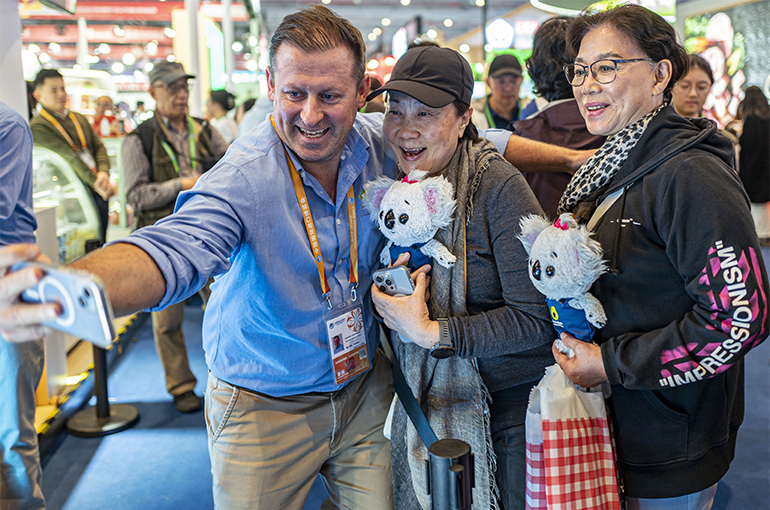 CIIE: Record Number of Australian Exporters Attend as Opportunity Beckons
CIIE: Record Number of Australian Exporters Attend as Opportunity Beckons(Yicai) Nov. 9 -- A record number of Australian companies took part in and penned contracts in the seventh China International Import Expo, which ended yesterday, as China continues to open up its market and as Chinese consumers develop a taste for high-quality products, providing a raft of new opportunities for Australian products.
“The Australian delegation to this year’s CIIE was the largest since the expo started seven years ago,” said Vaughn Barber, chair of the China-Australia Chamber of Commerce. Some 253 Australian companies took part, demonstrating strong confidence in the China market and renewing momentum for bilateral business ties.
“The CIIE is a great venue for Australian companies to come and engage with consumers and buyers. They will go back with a good story to tell, as people at home just don’t understand the scale, the opportunities that are here. Seeing really is believing,” he said.
Bilateral trade between China and Australia has reached new heights. "Trade is now at an all-time high, there is USD327 billion of two-way trade benefiting jobs in Australia, tax revenues and living standards," he said.
Making Inroads
Australian agricultural exporters made significant inroads into the Chinese market at the CIIE in Shanghai, with avocado, blueberry and other producers signing major trade agreements and memorandums of understanding.
Avocados Australia, the representative body for the Australian avocado industry, inked a AUD300 million (USD192.8 million) trade memorandum with Shanghai Markets, as well as a memorandum of understanding with Chinese Food Nutrition Association and JD Super, marking a crucial step toward market access.
Despite import restrictions, 800 kilograms of Australian avocados received special approval to be displayed at the CIIE.
"We currently don't have market access to China., but we're ready to ramp up exports as soon as we get that access," John Tyas, chief executive officer of Rocklea-based Avocados Australia, told Yicai.
Similarly, Berries Australia is working to introduce Australian blueberries to Chinese consumers. "Chinese consumers love to eat high quality fruit and they especially love Australian fruits," said Jesse White, general manager of Asia at Berries Australia.
Adapting Strategies
“Appreciation for high-quality sustainability has increased in China, as well as consumption in specific categories,” said Barber, who has lived in China for 26 years. For example, more people are drinking wines from Australia rather than Chinese rice wines, shopping has shifted to being almost completely online and the adoption of technologies such as AI is gaining momentum.
Australian exporters are adapting to China's digital-first retail environment. With online channels accounting for almost half of all fresh produce sales, companies are incorporating e-commerce into their distribution strategies. The rapid development of cold chain logistics in the bigger first and second-tier cities has made it possible to deliver fresh products efficiently.
"It's a nine-hour flight from Sydney to Shanghai, so the travel time is very, very quick and you have fantastic infrastructure," White said, highlighting China's logistics capabilities for fresh produce imports.
With a growing middle class, Australian exporters are targeting China's premium market segments, particularly in first and second-tier cities. "We'll be looking for premium markets that are willing and able to pay for a really top class avocado," Tyas said, adding that expansion into third-tier cities would be gradual and dependent on whether there is adequate supply.
For wine exporters returning to the Chinese market, the focus is on finding specific niches. "The market has changed for wine, but for us we think it's only positive," said Matthew Bahen, GM of North Asia sales at DeBortoli Wines. "There are still great niches with such a broad, diverse consumer base."
Potential to Collaborate
In an innovative approach to market development, Australian producers are planning to collaborate with Chinese farmers rather than compete with them directly.
"We're actually working with the Chinese industry because we think this market is big enough for both Australian and Chinese growers," Tyas said.
“I am optimistic about the future of trade collaboration between Australia and China. Particularly, I believe that the complementarities will only increase along with the potential to collaborate,” said Barber.
Editor: Kim Taylor